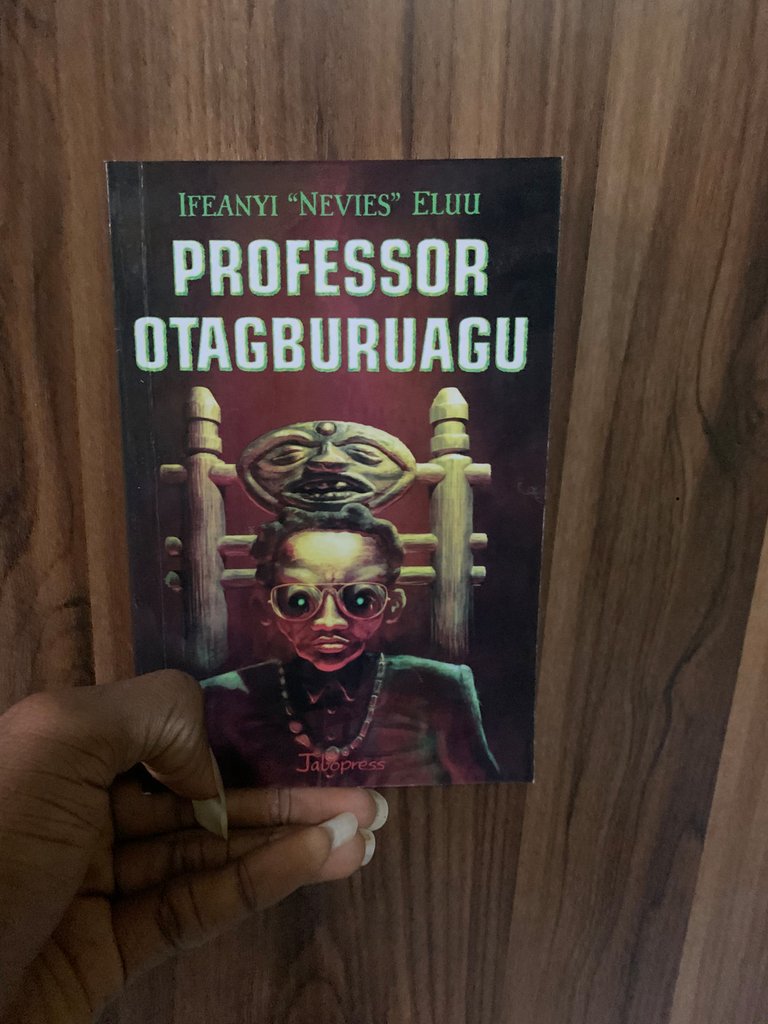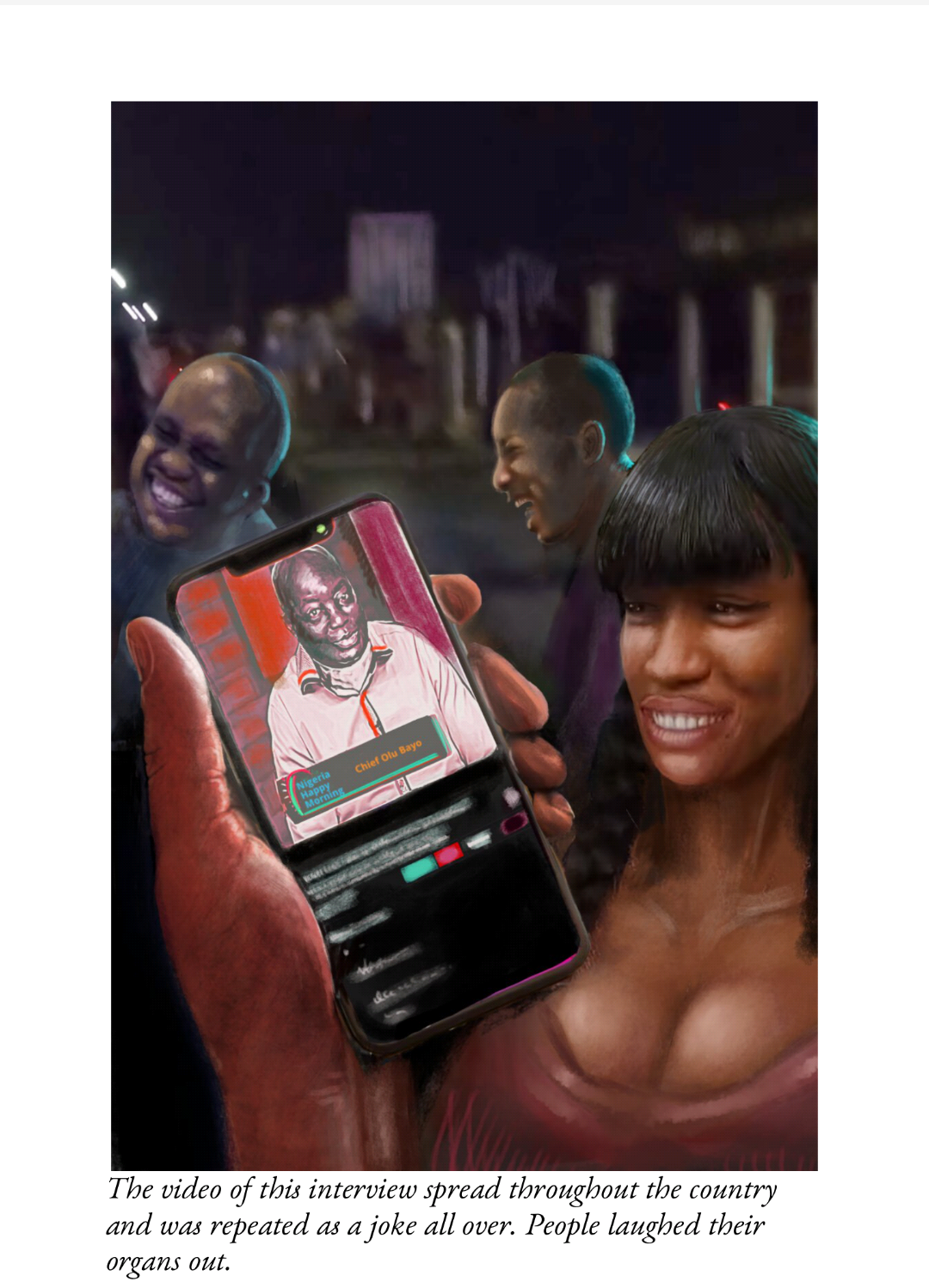Hey guys, for those of you who don't know Professor Otagburuagu is a novella written by me and illustrated by Scandinavian artist @katharsisdrill. It started here on hive from a writing contest hosted by @vcelier for @adsactly in 2018. It's a hive baby, y'all!
You can get the pdf version for 4 HBD from me right now or you can order the hard copy from anywhere in the world via this link:
https://katharsisdrill.art/the-katharsisdrill-shop/professor-otagburuagu/

This is an excerpt of one of the many funny parts of the book, enjoy!
Nigerians did not mourn the death of the president and the vice. They had hated the administration like they do most of the Nigerian administrations past, present and future. On the contrary, they celebrated the death, just like they had done immediately after the bloody coup far back in January 1966, and after the death of their 1998 president. There was drinking and dancing in the streets. A person might do you a favour, and when you'd be about to thank them, they'd say: “Don't mention it, it's on the beautiful season, the president is dead!” And wild, heartfelt mutual laughter would follow.
However, on National TV and the different news media, politicians gave solemn speeches regretting the deaths, consoling the families of the deceased and talking about the virtues of the deceased. The party men of the president and vice were the only ones who actually meant most of what they said. They were the only ones truly saddened by the deaths, truly wishing the families consolation. And although they didn't truly mean the president and vice had any of the virtues they ascribed to them, that didn't matter much; the deceased were their party men and that was the greatest virtue in the world.
But for the men who belonged to the opposing parties, they were having quite a hard time. They were happy the president was dead, they didn't have a care in the world for the families of the deceased, and they thought the president was an incompetent scoundrel. But they couldn't say this, it wouldn't be politically correct. It wouldn't help their image; speaking ill of the dead didn't seem professional, nor would it make them seem good-natured, empathetic and respectable, and just now an election was at hand. So they joined in giving their condolence messages.
The part about regretting the death of the president was easily negotiable, a very easy lie to tell. The part about being sorry for the families of the deceased too was an easy lie, but the part about attributing and extolling the president's virtues was a Herculean task. Some of them left that part out, but it is quite a custom to say something favourable about a dead person during condolences, so some of them didn't realize they could leave it out. So they fought the uphill task of coming up with virtues they could attribute to the president without hurting their own conscience and convictions too irreparably.
Some simply said: “he died like a patriot, in service of his country.” Others said: “he was a good man. If only he had gotten the chance to complete his term.” Even though this was his second term and all that was left of it was a year. One man, in a helpless attempt, only said the late president had some facial resemblance with a long deceased, widely loved Nigerian politician called Aminu Kanu. The man who said this last bit was Chief Olu Bayo and he was unfortunate enough to be interviewed on a morning show on national TV. And the interviewer brought up what he had said.
“So, Sir, you said the recently deceased president looks like Aminu Kanu?”
“Oh, yes, I said that.”
“Can you please tell us how, because a lot of people will disagree with you, Sir.”
“Oh, how can they disagree? Both men have a similar head shape. You know that round-ish shape.”
At this point the clever interviewer displayed a number of pictures on the screen.
“Please, Sir, can you point out the recent President's photo here and that of Aminu Kanu?”
Chief Olu Bayo jumped on it: “Oh, why, that is the recent president.” He said pointing.
“How about Aminu Kanu?”
“Oh, that is Aminu Kanu,” he said pointing to another face. “No, Sir, that is Herbert Macaulay, Sir.”
“Oh! Is it?”
“Would you try again, Sir?”
He pointed again with a frown.
“Wrong again, Sir, that is Bishop Samuel Ajayi Crowther.
Care to try again?”
“Oh! Err - err - I can't see these pictures so clearly, why bring such low quality images?”
“But this is HD, Sir.”
“Let us forget this game at once!”

The video of this interview spread throughout the country and was repeated as a joke all over. People laughed their organs out. The Chief, Olu Bayo was made a laughing stock. But soon there came another politician called Chief Kandu Ajah to the same morning show with the same interviewer: The Chief, Ajah, had been advised based on all the mockery that went to Chief Olu Bayo from the last interview that it was risky getting on the same show with that same clever interviewer, but Chief Ajah felt he had nothing to hide. His condolence messages hadn't contained anything nearly as extreme. He had even left the virtue part out, he had simply regretted the death and consoled the families of the deceased; his interview was going to go smoothly, he was sure. But some time into the interview it was time for the interviewer to trouble the waters. The interviewer said:
_“You expressed your heartfelt condolences on the recent tragic events that claimed the lives of the president and vice alongside some staff.”
“Yes, it was really sad, truly a tragedy.”
“But what do you have to say about the reports that you allegedly threw a party the day after, to celebrate it like a lot of common citizens have been known to do?”
Chief Ajah smiled,
“No, that was my wife's birthday party.”
“But we know your wife, Sir, you are an important figure in the country so your family is quite public knowledge. That party was a month ago, in April, and your wife's birthday is not until 6 months time on November the 3rd.”
“No comment.”
That was how another viral video was made._
The End